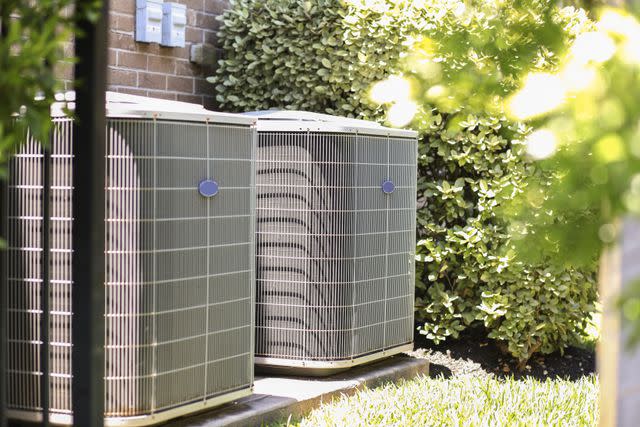Why Is My Air Conditioner Blowing Hot Air? 7 Potential Causes (and Fixes)
If you notice hot air coming from your air conditioner, there may be an easy fix.
It doesn't take an HVAC technician to know that an air conditioner blowing hot air is a sign that something's wrong. However, identifying why your air conditioner is blowing hot air isn't always easy. Some causes for AC blowing hot are simple fixes, while others will justify calling a technician.
In the hot summer months, HVAC service calls can be expensive with lengthy wait times, leaving you sweating it out in a hot house. To help get your AC working ASAP, we've outlined 7 reasons that your air conditioning could be blowing hot air as well as a few potential fixes.

Getty Images / fstop123
7 Reasons Air Conditioners Blow Hot Air
1. Thermostat Issues
The first place you should look if your AC is blowing hot air is your thermostat. Anything from an improperly set thermostat to a broken thermostat could cause an air conditioner to blow warm air. Start by changing the setting on your thermostat and make sure it is set to "Cool" and the fan is turned on.
Warning
If your air conditioner is struggling to reach the temperature set on your thermostat, lowering the temperature won't do anything. In fact, this can cause your already struggling system to overwork, causing further damage.
2. Dirty Filters
Your air conditioning system relies on a return filter to remove particles from the air before circulating it through the unit. When the filter gets fully clogged with particles, air can't freely move through it, which causes the unit to overwork. This can lead to malfunctions in various air conditioning components, which can cause the system to blow hot air. Replace your HVAC filter regularly to keep your house cool.
3. Dirty Coils
If your AC is struggling to cool your house, it could be that the coils are dirty. AC coils naturally get dirty over time, but the process can be expedited by not changing your return filter often enough or simply running the HVAC system without a filter in place. To clean the coils, turn the power off at the breaker and gently brush away the debris with a soft brush and a vacuum. For stubborn buildup on AC coils, use a foaming coil cleaner. On the outside unit, you can rinse the coils with a hose. For the inside unit, use a spray bottle to cut down on the mess.
Warning
Whenever cleaning on or around electrical appliances, always unplug the unit when possible. If dealing with a hardwired appliance, turn the power off at the breaker.
4. Refrigerant Leaks
Refrigerant is a key part of your air conditioner's cooling. Without enough coolant, it can't properly remove the hot air from your home and reintroduce cold air. If you suspect that your AC unit has a refrigerant leak, contact an HVAC technician to take a look. If necessary, they can fix the leak and recharge the system.
5. Frozen Coils
In order to cool the air, your AC system's evaporator coil must remove the heat from the air. Sometimes, excess condensation can build up on the evaporator coils. The condensation then freezes, which compromises the coil's function. The cause of the condensation can be a lack of airflow due to a dirty filter, clogged drain lines, or insufficient fan speed.
To start, turn your system off and allow the coils to thaw fully. Check the drain lines to ensure they're flowing freely and change your return filter if necessary. If the coils freeze again, contact an HVAC technician to inspect the system.
6. Faulty Compressor
If you've confirmed that your coils are neither frozen nor dirty, your air conditioner's reason for blowing warm air could be a faulty compressor. Without a properly functioning compressor, an air conditioner cannot compress the refrigerant that the evaporator coil uses to cool the air.
Here are some other signs to look for if you suspect you have a malfunctioning AC compressor:
Ticking sound
Rumbling sound upon startup
Low airflow
Tripping breaker
Leaky refrigerant
Blowing hot air
Contact an HVAC technician to diagnose your faulty compressor and uncover your repair or replacement options.
7. Tripped Breaker
Sometimes, a malfunctioning air conditioner may come as a result of a tripped electrical breaker. If the system isn't working at all, this is a likely reason. Even if the system is partially working, a tripped breaker could still be to blame, depending on the type of air conditioner you have. It may be that the outside unit has lost power while the inside unit is still working.
Flip the breaker back on to restore power to the unit and see if this fixes the problem. If the breaker trips again, refrain from restoring the power and contact an HVAC technician to identify the source of the problem.
How to Keep Your Air Conditioner Cool All Summer Long
Properly maintaining your AC can help prevent costly, untimely maintenance in the peak of summer. To ensure your HVAC system is ready to perform when you need it most, follow this AC inspection list:
Change filters regularly
Ensure drain lines are clear
Ensure coils are clean
Ensure the outside unit is free of debris like dirt, mulch, leaves, etc.
Check your thermostat to ensure it's communicating with your system correctly
Look for obvious leaks on and around refrigerant lines
Straighten bent coil fins
Adding these tasks to your home maintenance checklist could be all it takes to keep your air conditioner running smoothly all summer long and increase your HVAC system's lifespan.
Related: 8 Tips for Staying Cool When Your Air Conditioner Is Broken
For more Better Homes & Gardens news, make sure to sign up for our newsletter!
Read the original article on Better Homes & Gardens.

